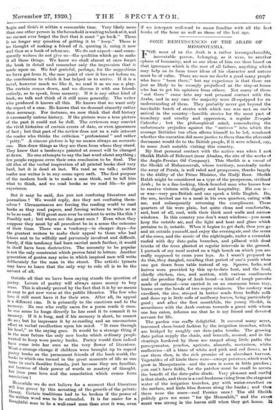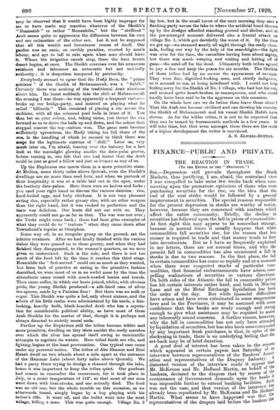SOME REMINISCENCES OF THE ARABS OF MESOPOTAMIA.
VOR most of us the Arab is a rather incomprehensible,
ine,crutable person, belonging, as it were, to another sphere of humanity, and as our idea's of him are thus based on that ignorance which is the root of all failure, anything which may help us to form truer ideas of his character and nature must be of value. There are now no doubt a good many people who have "been there," but my experience is that these era just as likely to be wrongly prejudiced as the stay-at-home who has to get his opinions from others. Not many of those " out there" came into any real personal contact with the Arabs, and in any ease the majority were ill-equipped for an understanding of them. They probably never got beyond the inevitable batch of stories with which one was met on one's arrival in the country—horrible stories for the most part of treachery and cruelty and oppression, a regular Ileuvae calendar; but the philosophical mind, remembering the unfortunate prejudice against the " natives " into which the average Britisher too often allows himself to be led, wondered whether the narration did more justice to them than the aforesaid document would do to the British people, if it were related, say, to some Arab notable visiting this country.
My first personal contact with the native was when I met Sheikh Habib of Behemet (near Abadan, the site of the works of the Anglo-Persian Oil Company). This Sheikh is a vassal of the Sheikh of Muhammerah, whose territory, nominally under the sway of Persia, is well ruled and prosperous, thanks largely to the ability of the Prime Minister, the Hadji Rees. Sheikh Habib might be considered as a type of the prosperous, civilized Arab ; he is a fine-looking, black-boarded man who knows how to receive visitors with dignity and hospitality. His son is— or was—very pro-British and can speak a little English. He, the son, invited me to a meal in his own quarters, eating with me, and subsequently returning the compliment. These quarters of his were plain, but quite clean and comfortable, and, best of all, Cool, with their thick. mud walls and narrow windows. In this country you don't want windows—you must keep the outside air, and the light and heat and glare which pertains to it, outside. When it begins to get dark, then you go and sit outside yourself, and enjoy the evening air, and the scent of the roses, and the music of the nightingale, under a verandah roofed with dry date-palm branches, and pillared with dead trunks of the trees planted at regular intervals in the ground. I partook of my meal seated on a high bench on which you are really supposed to cross your legs. As I wasn't prepared to do this, they dangled, recalling that period of one's youth when one got down from table instead of up. Spoons, forks, and knives were provided by this up-to-date host, and the food, chiefly chicken, rice, and mutton, with various condiments and the peculiar flaps of Arab bread—a kind of tough pancake made of oatmeal—was carried in on an enormous brass tray, borne over the heads of two negro retainers. The cookery was excellent, the rice, steeped in butter made from buffalo milk and done up in little rolls of mulberry leaves, being particularly good ; and after the first moutlifula, the young Sheikh, in accordance with the Arab custom towards a guest with whom one has eaten, informs me that he is my friend and devoted servant for life.
The garden was realty delightful. It covered many acres, traversed chess-board fashion by the irrigation trenches, which are bridged by roughly cut elate-pains trunks. The growing date palms supply the shade, and beneath, around, and in the clearings bordered by them are ranged along little paths the pomegranates, poaches, apricots, almonds, nectarines, white mulberries—all a blaze of white and pink and red flower, as I saw them then, in the rich promise of an abundant harvest. Vegetables of all kinds there were—except potatoes, which won't grow in Mesopotamia—and the corn is sown in little patches ; you can't have fields, for the patches must be small to secure the benefit of the date-palm shade. Very pleasant and restful is that shade, and there is a cool freshness rising from the stagnant water of the irrigation trenches, gay with water-crowfoot on the surface, and little blue flowers along the banks ; and. them there were the roses—real Persian ones ! The old Sheilds politely gave me some "for tile Memsahib," and the sweet scent was strong in the leaves still when they cot homo.
may be observed that it would have been highly improper for me to have made any mention whatever of the Sheikh's " Memsahib " or rather "Memsahibs," but the " civilized " Arab seems quite to appreciate the difference between his own and our estimation of the other sex. Let it not be supposed that all this wealth and luxuriance comes of itself. Our garden was an oasis, an earthly paradise, created by man's labour, and apt to fall to ruin again when man should leave It Where the irrigation canals stop, there the bare brown desert begins, at once. The Sheikh exercises over his numerous retainers and labourers an autocratic but not unkindly authority ; it is despotism tempered by patriarchy.
Everybody seemed to agree that the Hadji Rees, the "prime minister" of the Sheikh of Mulaammerah, was a Sahib." Certainly there was nothing of the traditional Arab aloofness about him. He burst suddenly into the dub at Muhannuerah the evening I was there—he was apparently a frequent visitor— broke up our bridge-party, and insisted on playing what he called "billiards.' This consisted of placing a cue across the cushions, with all the coloured pool balls in front of it. You then bet on your colour, and, taking turns, you thrust the cue forward so as to drive the balls up and down, and the colour that stopped nearest the top cushion won. The game soon became sufficiently uproarious, the Hadji taking his full share of the cue, in the handling of which he seemed to think there was scope for the legitimate exercise of "skill." Later on, very much later on, I'm afraid, leaning over the balcony f or a last look at the moonlight glowing amidst the date-palm groves, before turning in, one felt that one had learnt that the Arab could be just as good a fellow and just as human as any of us.
Up the Euphrates one meets them in a more primitive state. At Medina, some thirty miles above Qurnah, even the Sheikh's dwellings are no more than reed huts, and when we partook of their hospitality it was at a table laid out in the open, under the feathery date-palms. Here there were no knives and forks ; you used your right hand to discuss the various dainties : rice, hard-boiled eggs, and baby chickens. It is not very pleasant eating rice, especially rather greasy rice, with no other weapon than the right hand, but it was cooked to perfection and the taste was delicious. Our hosts did not eat with us. They apparently could not go as far as that. The war was not over ; the Turks might come back ; there had been grim examples of what they could do to " traitors " when they came down after Townahend's repulse at Ctesiphon.
Some way off, in an irregular group on the ground, sat the inferior retainers. After we had finally finished with the various dishes they were passed on to these gentry, and when they had finished they disappeared, to the women's quarters, as we were given to understand. Such is the rule, and there is not too much of the food loft by the time it reaches this third stage. Meanwhile the " first-served " could eat as much as they wanted, but from lack of practice at eating in the primitive fashion described, we were most of us in an awful mesa by the time the attendants came round with much-needed basins and towels. Then came coffee, in which our hosts joined, whilst, with obvious pride, the young Sheikh produced—a silk-lined case of silver tea-spoons, made by a Parisian firm I But there was no milk or sugar. This Sheikh was quite a lad, only about sixteen, and the affairs of his little realm were administered by his uncle, a fine- looking, heavily built, black-bearded Arab who has a reputa- tion for considerable political ability, as have most of these Arab Sheikhs for the matter of that, though it is perhaps not always directed to strictly moral ends.
Further up the Euphrates still the tribes become wilder and more primitive, dwelling on tiny islets amidst the reedy marshes over which the river has spread itself owing to unscientific attempts to regulate its waters. Here tribal feuds are rife, and fighting begins at the least provocation. One typical case came under my personal notice. The tribes of Abu Shamar and Beni Hatab dwell on two islands about a mile apart at the entrance of the Hammer Lake (about forty miles above Qurnah). We had a party there trying to dredge a channel through the lake, hence it was important to keep the tribes quiet Our gunboat had reason to remember the occurrence, for it took place in July, in a moist temperature of 112°, so that most of our men went down with heat-stroke, and one actually died. The feud was an old one, but the whole trouble on this occasion, as we afterwards found, simply began by a boy playing with his father's rifle. It went off, and the bullet went into the next village, killing a man. This was quite enough. Village No. 2 lay low, but in the small hours of the next morning they sent flanking party across the lake to where the artificial bond thrown up by the dredger afforded standing ground and shelter, and at the pre-arranged moment delivered also a frontal attack an village No. 1, which got decidedly the worst of it. By the time we got up—we steamed nearly all night through the reedy chan- nels, feeling our way by the help of the searchlight—the fight was over for the time, the casualties having been about eighty, but there was much weeping and wailing and letting off of guns—the send-off for the dead. Ultimately both tribes agreed to pay a fine and keep the peace for six months. The Sheikhs of these tribes had by no means the appearance of savages, They were fine, dignified-looking men, and chiefly indignant, so it seemed to me, at being interfered with. I could not help feeling sorry for the Sheikh of No. 1 village, who had lost his son, and seemed quite heart-broken in- consequence, and who could hardly have been said to be the aggressor on this occasion.
On the whole how can we do better than leave them alone? That the Arab can become civilized and can develop his country the Sheikh of Muhanunerah and his vassal Sheikh Habib have shown. As for the wilder tribes, it is not to be expected that they can be tamed by bureaucratic methods in a few years. It will take time, but that even amongst these there are the seeds of a higher development the writer is convinced.
A. S. Emvuz-SuTrois.







































 Previous page
Previous page